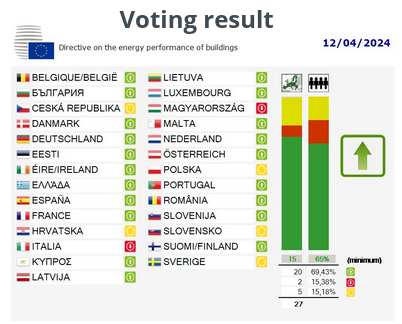Brussels – The European Union is moving ahead in sustainable construction while Italy lags with Hungary. The two countries are the only ones to have opposed the reform of building regulations, saying ‘no’ to the proposed directive on energy performance in construction, better known as ‘green homes.’ The Ecofin meeting in Luxembourg had the task of formally and finally approving a text on which inter-institutional agreement had already been found, with the final approval by the European Parliament on March 12.
In the vote, the outcome of which was expected, Italy wanted to hold its ground on what it considers to be a counterproductive choice, but what stands out, in the end, is an Italy-Hungary alliance that does not bear fruit and sees the two countries isolated. Other Member States that also were not convinced about proceeding with the forced restructuring of public and private housing ultimately chose to abstain (this is the case with Croatia, the Czech Republic, Poland, Slovakia, and Sweden).
 Giorgia Meloni’s Italy and Viktor Orban’s Hungary are thus merely sending a political signal of disapproval, but they will have to comply like everyone else. After the directive’s publication in the official journal, there will be two years, and then renovation of houses will have to begin.
Giorgia Meloni’s Italy and Viktor Orban’s Hungary are thus merely sending a political signal of disapproval, but they will have to comply like everyone else. After the directive’s publication in the official journal, there will be two years, and then renovation of houses will have to begin.
From 2030, new buildings must be zero-emission. For residential buildings, Member States will have to take measures to ensure an average primary energy use reduction of at least 16 percent by 2030 and at least 20-22 percent by 2035. The new directive also envisages that member states will have to renovate 16 percent of the worst-performing non-residential buildings by 2030 and 26 percent by 2033 by introducing minimum energy performance requirements. By 2040, all conventional fossil-fueled boilers will have to be phased out.
English version by the Translation Service of Withub![Un particolare del 'bosco verticale' a Milano [foto: Wikimedia Commons]](https://staging.eunews.it/wp-content/uploads/2024/04/case-verdi-750x375.png)





